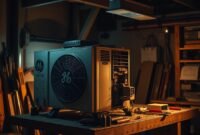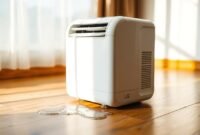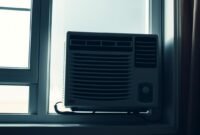Ever wondered why your AC compressor keeps tripping minutes after startup? This problem can make a cool summer day feel like a sweltering nightmare. An air conditioner pulling too much electrical current can shut down automatically. This is to protect your home from electrical hazards.
When your AC compressor trips after just a few minutes, it means there’s a problem. These issues can range from electrical to mechanical failures. They can quickly turn from minor annoyances to costly repairs. It’s important to understand why your compressor is tripping to keep your cooling system running well.
I’ll show you the main reasons for AC compressor tripping. I’ll also help you figure out what might be causing the problem before it gets worse.
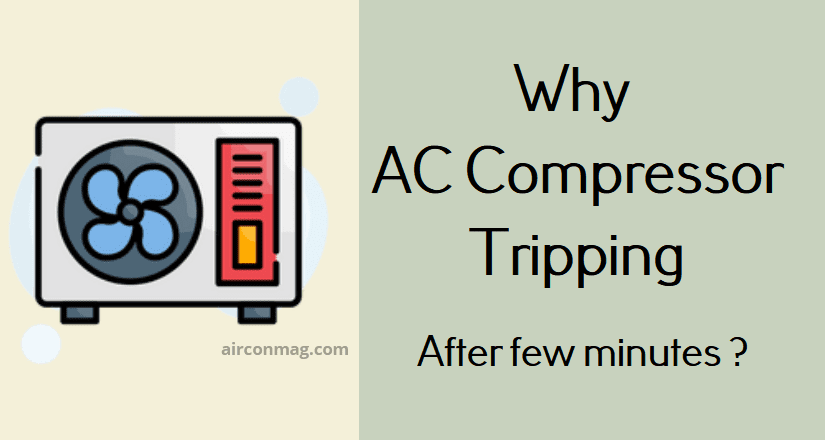
Understanding AC Compressor Function and Common Issues
The ac compressor is the heart of your cooling system. It pumps refrigerant with great precision. It’s like the engine of a car, making everything run smoothly when it works right.
An ac compressor turns low-pressure refrigerant into high-pressure gas. This is key for moving heat out of your home. It’s what keeps you cool on hot days.
How Your Cooling System Should Function
A good compressor has a few important traits:
- It keeps the cooling steady
- It starts up smoothly without weird sounds
- It circulates refrigerant well
- It uses energy efficiently
Warning Signs of Possible Problems
Watch out for these signs of trouble:
- It cycles on and off too much
- You hear grinding or clicking sounds
- Cooling isn’t as good as it should be
- Electric bills are way higher
Performance Impact
Problems with the compressor hurt your whole cooling system. A bad compressor uses more energy, keeps temperatures uneven, and might even fail completely.
The Science Behind Circuit Breaker Tripping
When your AC compressor trips the circuit breaker, it’s not just a minor glitch. It’s a key safety feature that protects your home and electrical systems. AC technicians often view circuit breaker tripping as a sign of deeper electrical issues.
Read also: AC Trips Breaker After 5 Minutes?
Circuit breakers are like the protectors of your electrical setup. They cut off power if too much current flows, avoiding fires and damage. If the compressor uses too much electricity, the breaker quickly stops power to prevent overheating or electrical shorts.
- Prevents electrical overload
- Protects home electrical systems
- Signals possible equipment problems
Frequent tripping of the compressor suggests something’s amiss with your AC system. Several things can cause this safety response:
- Electrical motor strain
- Insufficient voltage supply
- Mechanical failures in the compressor
- Wiring issues
Professional AC technicians suggest looking into the cause of frequent tripping. Ignoring these signs could lead to bigger and more costly repairs later on.
Dirty Air Filter: A Primary Culprit
Your AC unit’s air filter is key to keeping it running well. If it gets clogged with dust, debris, and allergens, big problems can arise.
A dirty air filter limits airflow. This makes your AC compressor work too hard and might even trip the circuit breaker. This extra effort can raise your energy bills and harm your system.
How Clogged Filters Impact Compressor Performance
A blocked air filter cuts down airflow. This leads to several big issues:
- Increased energy consumption
- Reduced cooling efficiency
- Higher risk of compressor overheating
- Potential circuit breaker tripping
Proper Filter Maintenance Guidelines
To avoid filter-related issues, follow these steps:
- Check your air filter monthly
- Clean or replace filters every 60-90 days
- Use high-quality filters made for your AC unit
- Replace filters more often if you have pets or allergies
When to Replace vs Clean Filters
Some filters can be cleaned, while others need to be replaced. Disposable fiberglass filters should be thrown away. Washable filters can be cleaned with water and mild detergent. Make sure they’re dry before putting them back to avoid mold.
Keeping your air filters clean helps your AC compressor. It also boosts system efficiency and can save you from expensive fixes.
Investigating Electrical Issues and Loose Connections
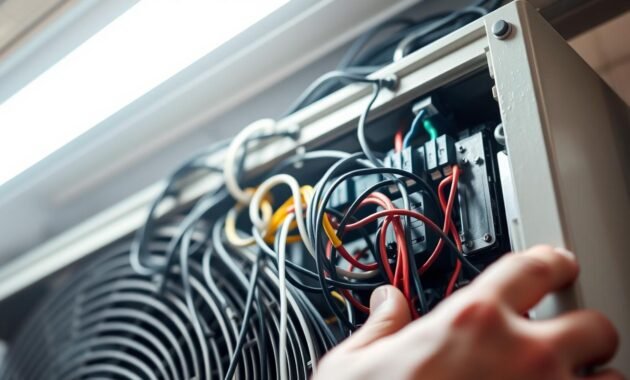
Electrical problems can be a serious threat to your air conditioning system’s performance. Loose wires and faulty electrical connections often create dangerous situations. They can trigger your circuit breaker to trip unexpectedly. As an experienced HVAC professional, I’ve seen countless instances where electrical issues cause significant AC system failures.
AC technicians frequently encounter several critical electrical problems that can disrupt your cooling system:
- Loose electrical connections in the compressor unit
- Damaged wire insulation
- Corroded electrical terminals
- Overloaded circuit breaker
When loose wires exist within your AC system, they generate excessive heat and resistance. This can create electrical arcing, which poses a significant safety risk. It causes your circuit breaker to trip as a protective measure. The sparking can potentially damage expensive components and create fire hazards.
Professional AC technicians recommend regular electrical inspections to prevent these dangerous scenarios. A thorough check can identify loose connections before they become major system failures. If you notice frequent circuit breaker trips or hear unusual buzzing sounds near your AC unit, it’s time to call a professional.
Attempting DIY electrical repairs can be extremely dangerous. Certified technicians have the specialized tools and knowledge to safely diagnose and repair complex electrical issues in your air conditioning system.
Why is Your AC Compressor Tripping After Few Minutes
When your air conditioning system trips the compressor often, it’s frustrating and worrying. I’ll explain why this happens and what might be causing it.
The compressor starts working, but something stops it. Many things can cause this, like electrical or mechanical issues.
Initial Startup Problems
At first, several problems can make the compressor trip:
- Power surge overwhelming the system
- Electrical circuit overload
- Damaged internal wiring
- Inadequate voltage supply
Overload Protection Mechanisms
Modern AC systems have safety features. They shut down the compressor if it detects problems. This prevents serious damage.
Read also: Why Does My AC Compressor Shut Off After 2-3 Minutes?
Temperature-Related Issues
Extreme temperatures can stress your AC. If it gets too hot or cold, the compressor might trip. This could mean there’s a problem with the refrigerant or system efficiency.
Getting a professional to check it is the best way to find out why. They can fix it before it causes more damage.
Condenser Coil Problems and Solutions
Dirty condenser coils can really hurt your AC unit’s performance. These parts are key for cooling your air. When they get dirty, they can’t cool well, causing big problems.
AC techs often find dirty coils as a main cause of trouble. The dirt stops heat from being released right. This makes your AC work too hard, leading to many issues.
- Visual signs of dirty condenser coils:
- Reduced cooling efficiency
- Increased energy consumption
- Unusual noises from the AC unit
- Potential consequences of neglected coils:
- Compressor overheating
- Higher electricity bills
- Potential complete system failure
Keeping your coils clean is important. While some can clean them, I suggest getting a pro. AC techs have the right tools and know-how to clean without harming your AC.
If your AC isn’t working right, act fast. A pro check can prevent expensive fixes and make your AC last longer.
Compressor Motor and Hard Start Kit Issues
AC compressor problems can be hard to figure out, like when it won’t start. As compressors get older, they often have trouble starting. This can cause big electrical problems and might even make the system fail.
The fan motor is key to your air conditioning working right. If the compressor has trouble starting, it might mean there are bigger mechanical issues that need fixing right away.
Signs of Motor Failure
Spotting motor failure early can save you a lot of money. Look out for these signs:
- Unusual humming or buzzing sounds during startup
- Frequent circuit breaker tripping
- Inconsistent cooling performance
- Burning electrical smell near the AC unit
Benefits of Installing a Hard Start Kit
A hard start kit can really help an old AC system. It gives the compressor an extra electrical push to start up.
| Hard Start Kit Advantages | Impact on System |
|---|---|
| Reduced startup current | Lower electrical strain |
| Extended compressor lifespan | Minimized wear and tear |
| Lower energy consumption | Decreased utility bills |
Professional Repair Options
While some people try to fix things themselves, complex compressor motor issues need a pro. A certified HVAC technician can find and fix the problem. They make sure your system works well for a long time.
Low Refrigerant Levels and System Leaks
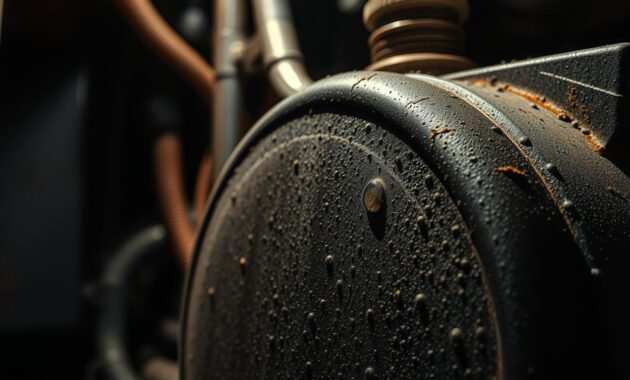
Your ac compressor needs the right amount of refrigerant to work well. If it doesn’t have enough, it can cause big problems. This can lead to unexpected shutdowns and damage to your ac unit.
Refrigerant leaks can sneak up on you and hurt your AC system’s performance. These leaks often happen in important parts of the ac unit, like:
- Evaporator coils
- Refrigerant lines
- Connection points
- Compressor seals
Professional ac technicians can find refrigerant problems quickly. They use special tests to find leaks and figure out how to fix them.
Signs you might have low refrigerant include:
- Less cooling power
- Ice on refrigerant lines
- Strange hissing sounds
- Higher energy bills
Trying to fix refrigerant problems yourself can be risky. It’s also bad for the environment. Always call certified ac technicians. They know how to handle refrigerant safely and get your system working right again.
The Impact of Outdoor Unit Cleanliness
Keeping your ac unit’s outdoor unit clean is key for top performance. Dirty condenser coils can hurt your cooling system’s efficiency. They can also cause unexpected breakdowns. As someone who’s been around for a while, I’ve found that a clean outdoor unit helps avoid compressor problems.
Dirt and debris can wrap around your AC system like an insulation blanket. When the condenser coils are dirty, your ac unit can’t cool properly. This makes it work harder, using more electricity and risking a circuit breaker trip.
- Remove leaves, grass clippings, and debris around the outdoor unit
- Clean the exterior fins carefully with a soft brush
- Trim vegetation within 2 feet of the unit to ensure proper airflow
While you can clean it yourself, AC technicians suggest a professional deep clean once a year. They can really get into the dirty condenser coils and check for any issues that might stress the system.
Regular maintenance does more than just prevent compressor trips. It also makes your AC last longer. A clean outdoor unit means better cooling, lower energy bills, and fewer repair costs.
Conclusion
When your AC compressor keeps tripping, it’s a clear signal that something isn’t right with your cooling system. Ignoring these warning signs can lead to more expensive repairs down the road. AC technicians always stress the importance of addressing compressor issues quickly and professionally.
The key to preventing ac compressor tripping is regular maintenance and proactive care. Most problems start small – a dirty filter, low refrigerant, or electrical connection issue. By catching these early, you can save significant money and prevent complete ac unit breakdowns.
While some minor maintenance tasks can be handled by homeowners, complex ac compressor problems demand professional expertise. Trying to diagnose or repair these issues without proper training can be dangerous and potentially void your system’s warranty. A qualified AC technician can provide a diagnostic check, identify root causes, and implement long-lasting solutions.
Remember, your air conditioning system is an investment in home comfort. Treating it with care, scheduling regular professional inspections, and responding quickly to warning signs will help ensure your AC unit remains reliable and efficient for years to come.
